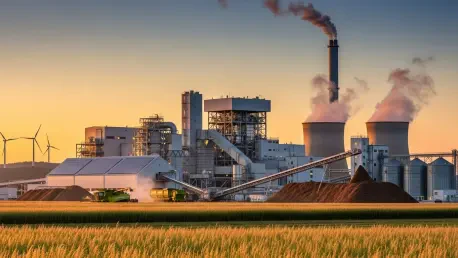I’m thrilled to sit down with Christopher Hailstone, a seasoned expert in energy management and renewable energy, who also serves as our go-to Utilities specialist. With his deep knowledge of electricity delivery, grid reliability, and security, Christopher is uniquely positioned to shed light on the recent developments surrounding Drax Group, a key player in Britain’s energy sector. Today, we’ll dive into the ongoing Financial Conduct Authority (FCA) investigation into Drax’s biomass sourcing disclosures, explore the company’s past regulatory challenges, and discuss the broader implications for sustainability and energy policy in the UK.
Can you walk us through the core issue of the FCA’s investigation into Drax Group and why it’s significant for the energy sector?
Absolutely, Silvia. The FCA is looking into Drax Group’s biomass sourcing disclosures, specifically focusing on statements made between January 2022 and March 2024. This includes their annual reports from 2021 to 2023 and whether they complied with financial disclosure rules. Drax supplies about 5% of Britain’s electricity through biomass, and with billions in green energy subsidies at stake, any question about transparency in their sourcing practices raises big concerns. It’s not just about Drax—it’s about trust in how renewable energy companies report their environmental impact, which is critical for investors and policymakers alike.
How has Drax responded to this scrutiny from the FCA, and what does their approach tell us about their strategy?
Drax has stated that they’re fully cooperating with the FCA, though they haven’t shared much beyond that. This suggests a cautious approach—acknowledging the investigation without fueling speculation. It’s a smart move to avoid further damaging public or investor confidence, especially since they’re already under a spotlight after last year’s issues with another regulator. Their focus seems to be on managing the narrative while working behind the scenes to address any concerns the FCA might raise.
Speaking of past issues, can you explain what happened with the Ofgem investigation into Drax and how it ties into the current situation?
Sure. Last year, Ofgem, the UK’s energy regulator, investigated Drax and found problems with how they reported data on wood sourced for biomass, particularly from Canadian forests. They were fined 25 million pounds—about 33.77 million dollars—for these reporting inaccuracies. Importantly, Ofgem didn’t find any violations in Drax’s sustainability practices or issues with their renewable obligation certificates, but the fine still highlighted gaps in transparency. That history of misreporting likely contributed to the FCA’s decision to dig deeper into their disclosures now.
Drax has defended its biomass sourcing practices amid criticism. How do they justify their methods, and what’s their argument for sustainability?
Drax claims they only use wood residuals or byproducts—basically, leftover material from trees primarily harvested for lumber. Their argument is that this doesn’t contribute to deforestation and that their demand for wood actually supports sustainable forest growth by incentivizing responsible management. It’s a perspective that tries to frame biomass as a win-win, both for energy production and environmental health, though not everyone buys into that logic, as we’ll see.
On the flip side, environmental groups have been vocal about their concerns. What are the main objections they raise about Drax’s biomass operations?
Environmental groups are skeptical about the sustainability of burning wood pellets for electricity. Their primary concern is that it’s not as green as it’s made out to be—burning wood releases carbon, and the process of regrowing forests to offset that takes decades, if it happens at all. There’s also specific criticism about sourcing from regions like Canadian forests, where some argue that even using residuals can harm ecosystems or that the supply chain isn’t as tightly controlled as Drax claims. It’s a heated debate about whether biomass truly fits into a net-zero future.
Financially, this investigation has hit Drax hard. Can you describe the impact on their stock prices and what that reflects about investor sentiment?
When news of the FCA investigation broke, Drax’s shares took a significant hit, dropping as much as 12.4% to 617 pence. They did recover slightly, closing the day down 9.2%, but that initial plunge shows how sensitive investors are to regulatory risks, especially for a company tied to government subsidies and green energy goals. It reflects broader uncertainty—not just about Drax, but about how political and regulatory scrutiny might reshape the biomass sector’s financial outlook.
Beyond the financials, there’s talk of political ramifications. How might this investigation influence government policy or support for biomass in the UK?
This probe puts Drax back under intense scrutiny, and it’s happening at a time when the UK government is already planning to halve biomass subsidies for Drax between 2027 and 2031. Analysts have noted that this could increase political pressure to rethink post-2027 biomass support plans altogether. With Britain aiming to largely decarbonize its electricity sector by 2030, the government might lean harder on other renewables if biomass continues to face credibility issues. It’s a pivotal moment for how policymakers balance energy security with sustainability commitments.
Looking ahead, what is your forecast for the future of biomass energy in the UK, given these regulatory and environmental challenges?
I think biomass will remain part of the UK’s energy mix for the near term, especially as a transitional fuel while other renewables scale up. However, the regulatory heat on companies like Drax could push stricter reporting standards and possibly tighter restrictions on sourcing. If environmental concerns gain more traction, we might see a shift in subsidies toward wind or solar. The big question is whether biomass can prove its sustainability credentials in a way that satisfies both regulators and the public. It’s going to be a bumpy road, but I believe there’s still a window for the sector to adapt and rebuild trust if transparency improves.









